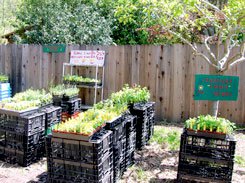A Recipe for Success: Kids, Dirt, and Gardening
On warm spring days, instead of leaving their hearts and minds in the classroom, my students often turned to the outdoors.

The study of plant life is a staple in biology curricula -- children explore seeds and how plants grow, young adolescents focus on cells, and teenagers continue their studies with more in-depth investigations of botany and plant physiology.
Reading about plants is usual in the traditional school curriculum, but working with the soil, growing different varieties of plants, and eating the plants you grow is uncommon.
However, my plant lessons rarely required a textbook. The scope and sequence of my lessons on plants ranged from learning about soils (undertaking a soil profile) to studying seeds ("What is a seed?"), digging in the dirt (good for building strong bodies and minds), and making a classroom garden.
Soils
I had a lot of help from the local 4-H agent, who conducted soil profiles for me and provided eggs for our chick-hatching observations. From time to time, the agent would stop by the classroom to share and to see how things were going.
The local 4-H Club did professional soil samples for the class garden and other gardens in our community. We learned about soil layers, textural classes, color, water-holding capacity, organic content, and pH balance. We also discovered how to alter the soil in order to make it better for our work.
All this made my students think more about the dirt beneath our feet. Soil is one of our most important natural resources, and it's important that students know about this aspect of the natural world and apply their knowledge to important factors such as land use, erosion, pollution, and urban planning.
School Gardens
There is no salad in the world as wonderful as the one you grow yourself, especially for students who have never tasted a homegrown tomato or pulled lettuce and other salad fixings from the rich earth. I remember being on a farm in the summertime with a saltshaker in my pocket, sampling the soil's tasty bounty. But my students didn't know where their food came from.
At another school where I worked, however, there were strawberry gardens. During recess, we would check on the progress of the strawberries, and, later in the season, we'd eat them -- so delicious!
A parent then convinced me to do a gardening project. He brought his little tractor and plowed the land, bought us tools and seeds, and contributed his know-how. An important learning was to plant only varieties of crops that are harvested early in the area so that we could collect and eat our lessons before school got out for the summer. We found out about the National Gardening Association and applied for and received a Youth Garden Grants award.
Let me direct you to some resources for ideas about gardening lessons and activities. Start planning now for the next school year so you can cultivate a more interesting way to learn about plants! And please add your own advice and thoughts about how to enrich learning about gardening.
Edutopia.org Resources
That's Soil, Folks!: Garden Gear That's Not Garden Variety
Other Resources
A Soil Profile (U.S. Department of Agriculture)
The Great Plant Escape: What Is a Seed? (University of Illinois Extension)
Planting Science (Botanical Society of America)
Fast Plants (University of Wisconsin at Madison)
Bottle Biology (University of Wisconsin at Madison)